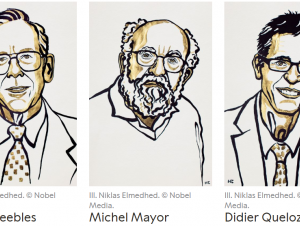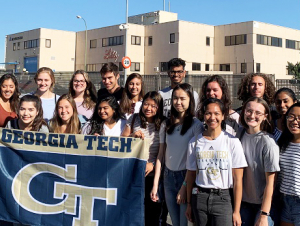To request a media interview, please reach out to experts using the faculty directories for each of our six schools, or contact Jess Hunt-Ralston, College of Sciences communications director. A list of faculty experts is also available to journalists upon request.
Latest News
The 2019 Nobel Prize in Physics was awarded "for contributions to our understanding of the evolution of the universe and Earth's place in the cosmos." Georgia Tech scientists John Wise, Gongjie Li, and Chris Reinhard reflect on the award-winning work and its impact on their own research.
First-year biochemistry major Baylor Reini wins quiz 3 of ScienceMatters Season 3.
Lilly Espana, in Alcobendas, Spain, hosted 24 Georgia Tech undergraduate students and two faculty, as part of the College of Sciences’ Barcelona Fall study abroad program.
The 2019 Nobel Prize in Physiology or Medicine was awarded jointly to William G. Kaelin Jr., Sir Peter J. Ratcliffe, and Gregg L. Semenza “for their discoveries of how cells sense and adapt to oxygen availability.” Georgia Tech assistant professors Amit Reddi and Young Jang reflect on the downstream effects of the award-winning work.
Mathematical concepts that have been around for centuries could help NASA save on fuel for future trips to the solar system's outer planets and moons, thanks to research from School of Mathematics Professor Rafael de la Llave.
Benjamin Breer is a second-year student doing a double major in physics and aerospace engineering. Last summer, while still a first-year student, he submitted his first first-author paper – “Energetic Ion Dynamics in the Perturbed Electromagnetic Fields near Europa” – to the Journal of Geophysical Research: Space Physics, which published the work on Sept. 6. The findings have significance for missions to search for life on Europa, a moon of Jupiter that is high on NASA’s list of places outside Earth to explore for life. The paper is likely to be the first of many scientific reports from Breer, who says, “I always feel like there is something else to be discovered.”








